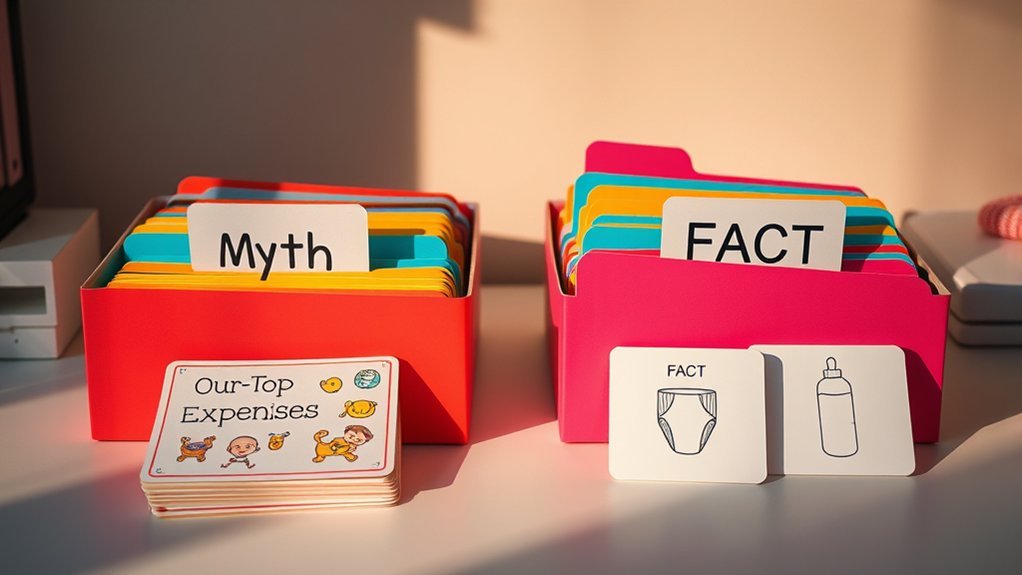When it comes to budgeting for a new baby, many parents fall prey to common misconceptions that can lead to financial strain. You might think the initial costs are the only concern, but ongoing expenses often catch families off guard. Plus, you may assume brand-name products are always better, but that’s not always the case. Understanding these myths is essential, especially as you consider long-term financial planning for your family. What other surprises could be waiting?
Common Misconceptions About Baby Expenses
When it comes to baby expenses, many new parents fall prey to at least three common misconceptions that can skew their budgeting efforts.
First, you might think that the initial costs are the only ones to contemplate, but ongoing expenses like diapers and formula add up quickly.
Second, there’s a belief that brand-name products are always superior. In reality, many generic items offer the same quality at a fraction of the price.
Finally, some parents underestimate healthcare costs, forgetting that routine check-ups and vaccinations can strain your budget.
Essential Items vs. Non-Essential Items
Determining which items are necessary versus non-essential for your baby can feel overwhelming, especially with the myriad of products marketed to new parents.
Start by identifying the basics: diapers, wipes, clothing, and a safe sleeping space like a crib or bassinet. These items are essential for your baby’s daily needs and safety.
Next, consider non-essential items that often entice you but aren’t important, such as elaborate toys or fancy clothing. While these may enhance your baby’s experience, they won’t impact their well-being.
Focus on what your baby truly needs to thrive, and resist the urge to overspend on trendy gadgets. Prioritizing essentials not only simplifies your shopping list but also helps you stay within budget while providing a nurturing environment for your little one.
The True Cost of Healthcare for Your Newborn
While you may be focused on the joy of welcoming your newborn, understanding the true cost of healthcare is essential for budgeting effectively.
Understanding the true cost of healthcare is crucial for effective budgeting as you welcome your newborn.
The first thing to evaluate is prenatal care, which can range from a few hundred to several thousand dollars, depending on your insurance.
After birth, your newborn will need regular check-ups, vaccinations, and potential emergency care. Each pediatrician visit can average between $100 to $250, and vaccines can add up to $1,500 in the first year.
Don’t forget about potential hospital fees, which can escalate quickly, especially if complications arise.
Budgeting for Unexpected Expenses
Even with careful planning, unexpected expenses can arise during your baby’s first year, making it crucial to budget for these potential surprises.
You might face costs like emergency doctor visits, unplanned baby gear purchases, or even last-minute childcare needs. To prepare, set aside a separate fund specifically for these unforeseen expenses. Aim for at least 10-15% of your monthly budget to cover these surprises.
Track your spending closely; it’ll help you identify patterns and adjust your budget accordingly. By anticipating these costs, you can avoid financial stress and guarantee you’re ready for whatever comes your way.
Long-Term Financial Planning for Families
Unexpected expenses can challenge your short-term budget, but planning for your family’s long-term financial future is equally important.
Start by setting clear goals, like funding education or saving for a home. Assess your current financial situation, including income, expenses, and debts, to determine how much you can allocate for long-term savings.
Diversifying investments can help mitigate risks and grow your wealth over time. Consider retirement accounts, college savings plans, and insurance options as essential components of your strategy.
Regularly review and adjust your plan to stay on track. Engaging with a financial advisor can provide tailored advice and keep you accountable.
Frequently Asked Questions
How Can I Track My Baby-Related Expenses Effectively?
To track your baby-related expenses effectively, use a budgeting app or spreadsheet. Categorize purchases, set limits, and regularly review your spending. This approach helps you stay organized and make informed financial decisions for your family.
What Are the Best Budget Apps for New Parents?
You’ll find several great budget apps for new parents, like YNAB, Mint, and EveryDollar. Each offers unique features, but the key is choosing one that fits your lifestyle and helps you track those baby expenses seamlessly.
Are There Financial Assistance Programs for New Parents?
Yes, there are financial assistance programs for new parents. You can explore government benefits, nonprofit organizations, and community resources that provide support for childcare costs, healthcare, and other essential expenses during this change.
How Can I Save on Baby Food Costs?
Think of saving on baby food costs as planting seeds for future growth. You can buy in bulk, choose store brands, and prepare homemade meals, ensuring your baby eats well without breaking the bank.
When Should I Start Saving for My Child’s Education?
You should start saving for your child’s education as early as possible. Even small contributions can grow considerably over time, easing future financial burdens and providing your child with valuable opportunities for academic success.
Conclusion
As you navigate the world of baby expenses, it’s ironic that many parents focus solely on those first big purchases, overlooking the continuous costs that sneak up later. You might think a fancy diaper bag is essential, while a simple, generic brand can do the job just as well. By recognizing these myths and planning for both expected and unexpected costs, you’ll find that budgeting isn’t just about surviving—it’s about thriving in your new role as a parent.
